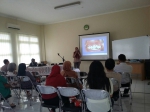Can Single-Cell Proteins Be Commercialized in Indonesia?
By Adi Permana
Editor Adi Permana

BANDUNG,itb.ac.id - The ITB Chemical Engineering Study Program held a class about the commercialization of bioprocessing research and results on Wednesday (2/3/2022). The lecture invited Dr. Budi Juliman Hidayat, a biotechnology researcher from Fujifikm Diosynth Biotechnologies in Copenhagen, Denmark. He specialized in cell culture and bioprocess products, specifically single-cell proteins.
Budi is an alumnus of ITB Chemical Engineering Class of 1988 who previously worked at the Environmental Impact Control Agency from the Ministry of Environment and Forestry. In his lecture, Budi discussed the high commercial value of single-cell protein that has the potential to help conserve the environment.
What are Single-Cell Proteins?
Single-cell proteins are derived from microbes or algae. This type of protein can be the key to solve food shortages; the global protein consumption rapidly escalates, causing rising fish demands which provide high protein content. If left uncontrolled, fishes can go extinct due to overfishing. Hence, a new type of protein is in search so that people can still receive their protein supply without starting any resource competition.
Methylococcus capsulatus is one of the bacteria that can function as a source of single-cell proteins. Found as sediments at the bottom of lakes in England, this bacterium is high in protein and a reliable source of methane carbon. It undergoes protein synthesis using the U-Loop Reactor that maximizes gas transfer continuously.
Creating this type of protein is not only environmentally friendly, but it also does not require large areas of land and fertilizers compared to soybean plantations. Moreover, these microbes do not need pesticides and copious quantities of water to accelerate their growth.
Commercial Challenges
The biotechnology industry in Denmark faced several issues with single-cell protein implementation in 2010. Such challenges are the absence of large-scale reactors, lack of in-house experience to cultivate M. capsulatus bacteria, no supply of final products to represent, and inadequate funding received. To commercialize single-cell proteins, strategies need to be planned.
Negotiation with interested investors is crucial to reaching a mutual agreement and more will participate in the funding of the industry. Investors should be convinced that this innovation has better potential than other proteins.
“For the first time, this innovation was successfully commercialized by UNIBIO in October 2021,” Budi noted. “Currently, the development of single-cell proteins in Indonesia is still done in factories.” Nonetheless, the nationally-conducted research is expected to yield high-quality products for commercialization.
Reporter: Tarisa Putri (Chemical Engineering, 2019)
Translator: Ruth Nathania (Environmental Engineering, 2019)



.jpg)

.jpg)
